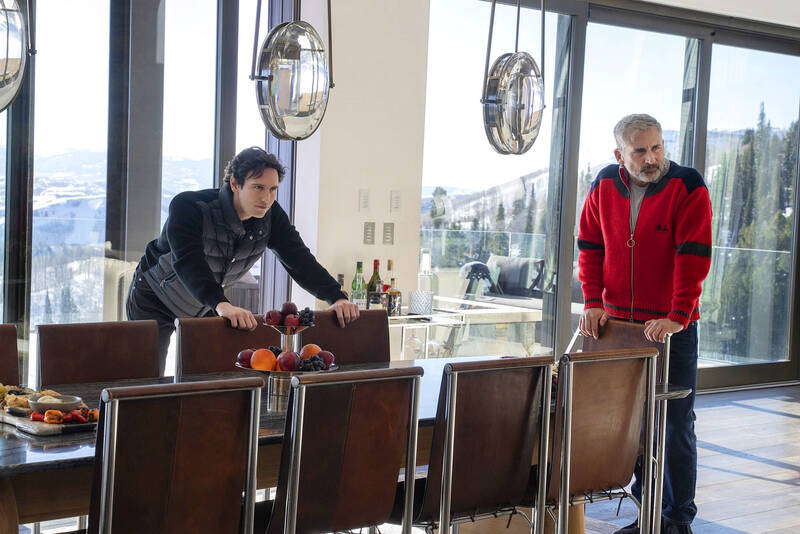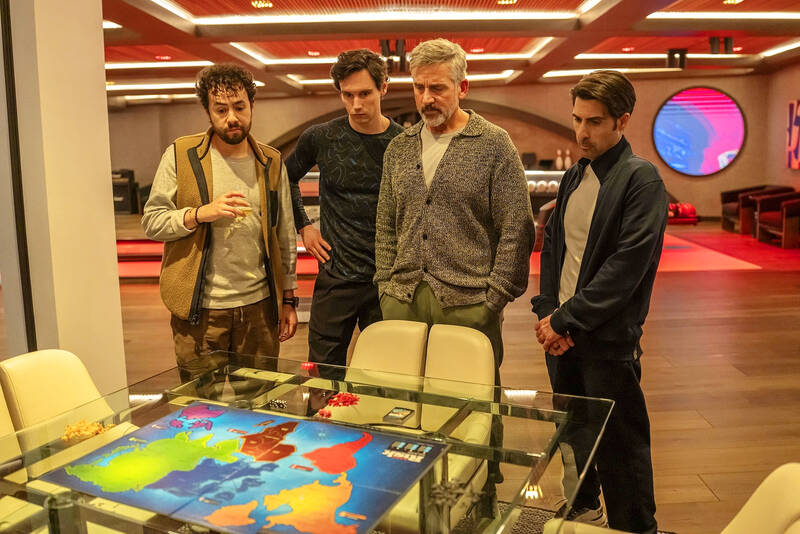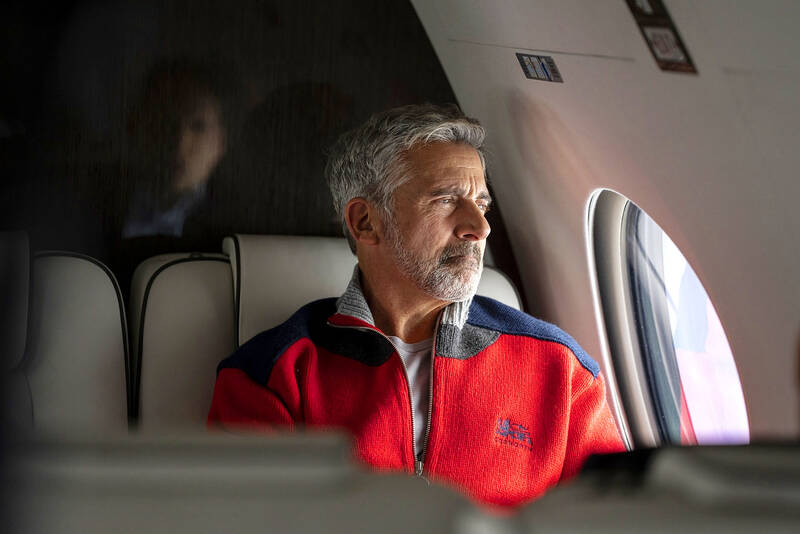Succession fans rejoice. Jesse Armstrong has again gathered together a conclave of uber-wealthy megalomaniacs in a delicious satire.
Mountainhead, which the Succession creator wrote and directed, is a new made-for-HBO movie that leaves behind the backstabbing machinations of media moguls for the not-any-better power plays of tech billionaires.
Or, at least, three billionaires. Their host for a poker weekend in the mountains at a sprawling estate named after Ayn Rand’s The Fountainhead is Hugo (Jason Schwartzman), the solo member of the group not to reach, as they say, “B-nut” status. His net worth is a paltry US$521 million.

Photo: AP
The others are three of the wealthiest men in the world. Randall (Steve Carell) is their senior, a kind of Steve Jobs-like mentor they all call “Papa Bear.” Jeff (Ramy Youssef), who runs the world’s leading AI company, calls Randall the “Dark Money Gandalf.” Lastly, but maybe most notably, is Venis (Cory Michael Smith), whose social media platform boasts 4 billion users globally.
But the latest update to Venis’ platform, named Traam, is causing havoc. As the four gather at Hugo’s isolated perch in the Utah mountains, news reports describe violence sweeping across Asia due to an outbreak of deepfakes on Traam that have wrecked any sense of reality.
Yet what’s real for this quartet of digital oligarchs — none of whom has a seemingly direct real-life corollary, all of whom are immediately recognizable — is more to the point of Mountainhead, a frightfully credible comedy about the delusions of tech utopianism. Each of the four, with the exception of some hesitancy on the part of Jeff, are zealous futurists. On the way to Mountainhead, a doctor gives Randall a fatal diagnosis that he outright refuses.

Photo: AP
“All the things we can do and we can’t fix one tiny little piece of gristle in me?”
But together, in Armstrong’s dense, highly quotable dialogue, their arrogance reaches hysterical proportions. While the cast is altogether excellent, this is most true with Smith’s Venis, a tech bro to end all tech bros. As the news around the world gets worse and worse, his certainty doesn’t waver. Earth, itself, no longer hold much interest for him. “I just want to get us transhuman!” he shouts.
Progress (along with net worth) is their cause, and much of the farce of Mountainhead derives from just how much any semblance of compassion for humanity has left the building. It’s in the way Venis blanches at the mention of his baby son. It’s in the way, as death counts escalate in the news on their phones, they toy with world politics like kids at a Risk board. In one perfectly concise moment, Venis asks, sincerely, “Do you believe in other people?”

Photo: AP
If Succession filtered its media satire through family relationships, Mountainhead runs on the dynamics of bro-styled male friendship. There are beefs, hug-it-out moments, passive-aggressive put downs and eruptions of anger. Part of the fun of Armstrong’s film isn’t just how their behavior spills into a geopolitical events but how it manifests, for example, in which room everyone gets.
All of Mountainhead unfolds in the one location, with white mountaintops stretching in the distance outside the floor-to-ceiling windows. It could be a play. Instead, though, it’s something that either hardly exists anymore or, maybe, exists everywhere: the made-for-TV movie.
There’s no lack of films made for streaming services, but many of them fall into some in-between aesthetic that couldn’t fill a big screen and feel a touch disposable on the small screen. But Mountainhead adheres to the tradition of the HBO movie; it’s lean, topical and a fine platform for its actors. And for Armstrong, it’s a way to keep pursuing some of the timely themes of Succession while dispensing lines like: “Coup-out the US? That’s a pretty big enchilada.”

JUNE 30 to JULY 6 After being routed by the Japanese in the bloody battle of Baguashan (八卦山), Hsu Hsiang (徐驤) and a handful of surviving Hakka fighters sped toward Tainan. There, he would meet with Liu Yung-fu (劉永福), leader of the Black Flag Army who had assumed control of the resisting Republic of Formosa after its president and vice-president fled to China. Hsu, who had been fighting non-stop for over two months from Taoyuan to Changhua, was reportedly injured and exhausted. As the story goes, Liu advised that Hsu take shelter in China to recover and regroup, but Hsu steadfastly

Taiwan’s politics is mystifying to many foreign observers. Gosh, that is strange, considering just how logical and straightforward it all is. Let us take a step back and review. Thanks to the Chinese Nationalist Party (KMT) and the Taiwan People’s Party (TPP), starting this year people will once again have Christmas Day off work. In 2002, the Scrooges in the Democratic Progressive Party (DPP) said “bah, humbug” to that. The holiday is not actually Christmas, but rather Constitution Day, celebrating the enactment of the Constitution of the Republic of China (ROC) on December 25, 1947. The DPP and the then pan-blue dominated legislature

Focus Taiwan reported last week that government figures showed unemployment in Taiwan is at historic lows: “The local unemployment rate fell 0.02 percentage points from a month earlier to 3.30 percent in May, the lowest level for the month in 25 years.” Historical lows in joblessness occurred earlier this year as well. The context? Labor shortages. The National Development Council (NDC) expects that Taiwan will be short 400,000 workers by 2030, now just five years away. The depth of the labor crisis is masked by the hundreds of thousands of migrant workers which the economy absolutely depends on, and the

If you’ve lately been feeling that the “Jurassic Park” franchise has jumped an even more ancient creature — the shark — hold off any thoughts of extinction. Judging from the latest entry, there’s still life in this old dino series. Jurassic World Rebirth captures the awe and majesty of the overgrown lizards that’s been lacking for so many of the movies, which became just an endless cat-and-mouse in the dark between scared humans against T-Rexes or raptors. Jurassic World Rebirth lets in the daylight. Credit goes to screenwriter David Koepp, who penned the original Jurassic Park, and director Gareth Edwards, who knows